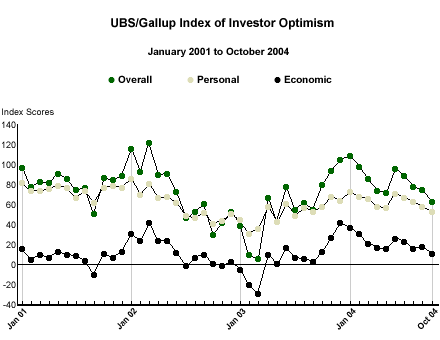October can be a scary month for investors. In October 1929, the market crashed and the U.S. economy sunk into a deep depression. Almost six decades later in October 1987, the market crumpled again. The way the market performs the October before an election can also make political incumbents shake in their boots.
The October UBS/Gallup Index of Investor Optimism* found overall investor optimism at a 13-month low of 62. While incumbents seek to paint the economy as growing, it appears that investors are still feeling jumpy -- their optimism has eroded over the past year.

Will weakened investor optimism affect national or local elections? Probably not. Though a sizable proportion of Americans are investors -- according to the Federal Reserve, about 52% owned stocks either directly or indirectly in 2001 -- in recent years there seems to be no direct connection between investor optimism and rewarding or punishing the incumbent party. For example, despite an even lower optimism score of 29 in October 2002, the Republican Party managed to maintain its majority in the House of Representatives and win back the Senate majority it lost in 2001. And despite greater investor optimism in 2000 (the Index stood at 132 in October of that year), Al Gore was not able to keep the Democrats in the White House.
The current erosion of investor confidence is more likely due to surging oil prices and sluggish economic growth than the effectiveness of any political campaign (see "Rising Gas Prices Fuel National Anxiety" in Related Items). Rising oil prices usually cast a ghoulish shadow over the market.
Bottom Line
Investor malaise may be frightful to incumbents, but barring major market movements in the final days of the election, economic indicators such as unemployment will likely have far greater political implications than where the Dow sits. Still, for superstitious investors, October has a haunting mystique as a time when the worst can happen. Judging by the recent decline in optimism, it appears that some may already be a little spooked.
*Results are based on telephone interviews with 800+ investors, aged 18 and older, conducted monthly between January 2000 and October 2004. For results based on the entire sample, one can say with 95% confidence that the maximum margin of sampling error is ±3 percentage points.
